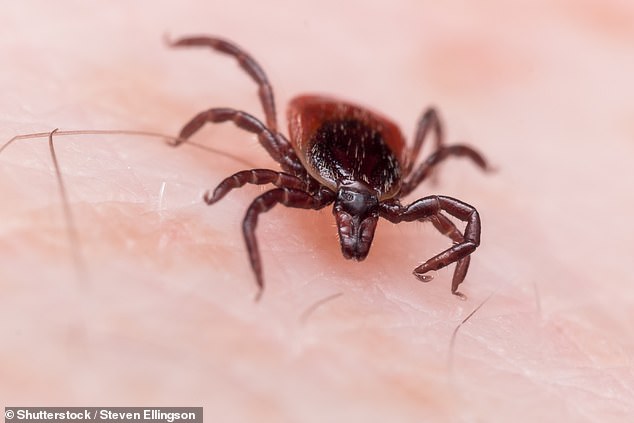A Connecticut woman has died from the rare tick-borne Powassan virus just a month after she was bitten by the parasite.
The person - who was not named - was in his 90s and lived in New London County, which borders Rhode Island.
Health officials said she was hospitalized with fever, headache, chest pain and an "altered mental status" two weeks after the tick bite in early May. The patient died 14 days later after becoming “unresponsive.”
It is the second death from the tick-borne disease in America this year, after a Maine man died from the virus in April.
The Powassan virus is rare — with about 28 people testing positive for it each year — but about one in 10 people infected dies, and half are left with lifelong disabilities.
There are no vaccines or medications for the disease; treatment instead focuses on relieving symptoms, including difficulty breathing and brain swelling.

The woman was in her 90s and was from New London County, which borders Rhode Island. Doctors said she died two weeks after being admitted to hospital when she became "unresponsive". She tested positive for the Powassan virus, which is transmitted to humans by deer or blacklegged ticks (pictured above).

Shown above are all states that have detected the Powassan virus since 2011 and the number of cases they have recorded in a decade (count for each state).

This shows the number of cases of Powassan virus recorded in the United States. A record 39 were recorded in 2019
Connecticut Health Commissioner Dr. Manisha Juthani, said the case was a reminder to "take action" to prevent ticks from "now until late fall."
She urged residents to keep ticks at bay with insect repellent and to avoid areas with tall grass where they often lurk.
“It is also important to carefully check for ticks after spending time outdoors, which can reduce the chances of you and your family members becoming infected with this dangerous virus,” she added.
Connecticut officials confirmed today that Powassan virus was the patient's cause of death. It was not clear if she had any underlying health problems.
In April, an unnamed Maine man was hospitalized with “neurological symptoms” due to the virus and later died.
It was also Connecticut's second case in the past six months, after a man in his 50s from Windham County, north of New London, was diagnosed in late March.
He was hospitalized with the illness after being bitten by a tick, but was later discharged to recover at home.
The Powassan virus is transmitted to humans by deer or blacklegged ticks – identified by their namesake legs – which pick up the disease from rodents such as marmots and squirrels.
Infected people experience symptoms a week to a month after the bite.
Early warning signs include fever, headache, vomiting and muscle weakness.
But if the virus spreads to the brain and central nervous system, they may also experience confusion, loss of coordination and seizures.
People infected with the virus cannot pass it on to others, the Centers for Disease Control and Prevention (CDC) says.
It also notes that a number of cases are likely to go undiagnosed each year because they do not trigger symptoms.
The deer or blacklegged tick – which carries this virus – is also responsible for causing people to get Lyme disease.
But this disease differs from Powassan disease in that its patients usually experience a characteristic “bulls-eye” rash around the area where they were bitten. It is also rarely fatal, although it can cause long-term health complications.
The Powassan virus is primarily found in northern states but has spread inland as far north as North Dakota. It has also been discovered as far south as South Carolina.
More deaths from the virus have been recorded this year than in 2020 - the last available - when there was just one. The CDC has yet to release 2021 data.
In 2019, the US recorded nine deaths from the virus - the most on record.

 Suche
Suche
 Mein Konto
Mein Konto

